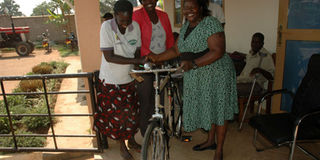Angwech led the 2006 group of women who protested naked

Pamela Judith Angwech (in green dress), founder of GWED-G giving bicycle to one of the members. PHOTO BY STEPHEN OKELLO.
What you need to know:
- Whatever it takes. Remember when in 2006, way before Dr Stella Nyanzi, a group of women from northern Uganda publicly undressed to express their anguish at the effects of the war in their region?
- Well, that was Pamela Judith Angwech’s procession of women from northern Uganda desperate to express their plight.
Pamela Judith Angwech’s passion for empowering women is a childhood aspiration as she grew up watching women struggle to raise their families alone. Today, she is the founder of Gulu Women Economic Development and Globalisation (GWED-G) through which she lives her dream.
From as young as 12, Angwech saw women return from the garden carrying fire hood and their husbands’ hoes on their heads and children on their backs as the men walk home freely. When her father died in 1996, her mother took over full time care of her and her brother. She pledged to fight for women’s rights if ever she was in a position of authority.
The birth of GWED-G
It all started with her volunteering stint with World Food Program in-charge of food distribution in the Internal Displace Peoples (IDP) camp. She witnessed an incident where a woman’s two-year-old baby’s neck was twisted while she struggled to get food in the queue. “She had the baby on her back and no one even noticed when her baby died even though she was crying,” narrates Angewch.
She also continuously saw and joined women who stayed behind to pick the beans that fall on the ground during food distribution to top up on their portions to feed their families. “Food was distributed once in a month. If you missed, your family went hungry for the whole month. Also, for those with bigger families, the portions were not enough for the month,” explains Angwech.
“I interacted with several women and interviewed them on the situations in the IPD camps,” she adds. “I learnt about young girls being forced into sexual relationships with soldiers to get some money and food, women in the camps being raped without getting justice and the resulting unwanted pregnancies, births and uncontrollable spread of HIV/Aids.” The knowledge compelled her to invest time and money in advocacy for women in northern Uganda.
Undressing in desperation
In 2006, Angwech organised an advocacy rally of northern women to join the peace team on its way to Garamba for peace talks with Joseph Kony and LRA rebels. There, Angwech and her procession decided to undress in expression of the plight inflicted on them at the hands of the war in the region.
Angwech, who had been working with the UN, resigned from her job that same year and started Gulu Women Economic Development and Globalisation ( GWED-G) under a mango tree in Awach sub-county in Gulu District to mainly fight gender based violence and advocate for the rights of children in northern Uganda, and empower women economically, socially and politically.
In Acholi tradition, women are expected to keep quiet about their problems and work hard during production while all property rights and ownership remain with the men, who also make all the important decisions in the homes.
Angwech said the role she played during Garamba peace talks attracted the attentions of many people in the western world who come in to give a helping hand, which helped the organisation expanded. She was also invited to attend UN conference on human rights in New York.
Achievements
Currently, GWED-G has employed 36 men who work together with women to reach fellow men and advocate for the plight of women. They have also so far empowered over 400 women in the region regardless of their education background.
“The women are encouraged to form groups then are given seed and agricultural tools to start up income generating activities. Others are trained in home economics activities from which they can make money to pay fees for their children,” offers Angwech.
Rose Lamara, a group member and GWED-G beneficiary in Pabbo Amuru District, says there are about 14 women in their group who underwent training in baking and cookery in 2010. They bake doughnuts, cookies and other bites, grind and pack peanut pastes and sell at retail shops at trading centers.
Their major markets are in Southern Sudan where some group members are assigned the sales responsibilities. Proceeds from the sales are used to pay school fees and the balance saved for investment, or given as school fees loans to some parents/guardians.
Lily Anywar, another beneficiary of the organisation testifies that they got seeds and agricultural inputs in 2014. “We decided to provide joint labour for our farms, so we would dig in each other’s farms on different days until we harvested,” she says.
“I used proceeds from my produce to pay fees for my three children in secondary school and opened a retail shop in one of the trading centers where I sell domestic goods in the evenings after retiring from the garden.” On her four acre garden, Anywar practiced inter cropping for commercial purposes. She planted groundnuts, sim-sim, vegetables, and some fruits.
Angwech says she is still looking forward for diplomats and donors so that she can lobby for funds to help women.
Tangible benefits
Politically, the group engages women leaders at local and national level in their community meetings so that issues concerning women at the grassroots can be forwarded to the policy makers in government.
“GWED-G has made women realise that they can do everything a man does to fight poverty. With women empowerment, I now receive less domestic violence cases in my office,” says Angwech, who was awarded best African woman in business and governance by CEO global.




